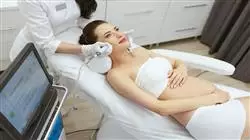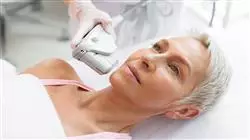University certificate
The world's largest faculty of physiotherapy”
Introduction to the Program
Your career as a physiotherapist will take a turn for the better when you specialize in Dermocosmetics"

People are looking for increasingly specialized skin care. Dermocosmetics initially started with a few disciplines that monopolized all the treatments, making it a very restricted and not very innovative area. However, the demand for new techniques and methodologies caused a transformation in this field and new disciplines were providing solutions to the different aesthetic problems.
In this way, Physiotherapy is one of them, and it is currently one of the fastest growing areas in the field of skin aesthetics. There are many patients looking for specialized physiotherapists, but there is still a lack of experts in the field who can offer the right services.
For this reason, this Postgraduate diploma in Dermocosmetics for Physiotherapists is the answer for all those physiotherapists who are looking for a way to progress and find new career paths, as it provides them with numerous skills that they can put into practice immediately.
You know that this qualification will help you in your professional performance. Don't wait any longer and enroll"
This Postgraduate diploma in Dermocosmetics for Physiotherapists contains the most complete and up-to-date scientific program on the market. The most important features include:
- The development of practical cases presented by experts in Dermocosmetics applied to Physiotherapy
- The graphic, schematic, and practical contents with which they are created, provide scientific and practical information on the disciplines that are essential for professional practice
- Practical exercises where self-assessment can be used to improve learning
- Its special emphasis on innovative methodologies
- Theoretical lessons, questions to the expert, debate forums on controversial topics, and individual reflection assignments
- Content that is accessible from any fixed or portable device with an Internet connection
More and more patients are looking for expert dermocosmetic physiotherapists to provide them with the solutions they are
looking for"
The program’s teaching staff includes professionals from the sector who contribute their work experience to this educational program, as well as renowned specialists from leading societies and prestigious universities.
The multimedia content, developed with the latest educational technology, will provide the professional with situated and contextual learning, i.e., a simulated environment that will provide immersive education programmed to learn in real situations.
This program is designed around Problem-Based Learning, whereby the professional must try to solve the different professional practice situations that arise during the course. For this purpose, the student will be assisted by an innovative interactive video system created by renowned and experienced experts.
You will be able to launch new services that will attract new patients"

The key to success in the field of Physiotherapy is specialization"
Why study at TECH?
TECH is the world’s largest online university. With an impressive catalog of more than 14,000 university programs available in 11 languages, it is positioned as a leader in employability, with a 99% job placement rate. In addition, it relies on an enormous faculty of more than 6,000 professors of the highest international renown.

Study at the world's largest online university and guarantee your professional success. The future starts at TECH”
The world’s best online university according to FORBES
The prestigious Forbes magazine, specialized in business and finance, has highlighted TECH as “the world's best online university” This is what they have recently stated in an article in their digital edition in which they echo the success story of this institution, “thanks to the academic offer it provides, the selection of its teaching staff, and an innovative learning method aimed at educating the professionals of the future”
A revolutionary study method, a cutting-edge faculty and a practical focus: the key to TECH's success.
The most complete study plans on the university scene
TECH offers the most complete study plans on the university scene, with syllabuses that cover fundamental concepts and, at the same time, the main scientific advances in their specific scientific areas. In addition, these programs are continuously being updated to guarantee students the academic vanguard and the most in-demand professional skills. In this way, the university's qualifications provide its graduates with a significant advantage to propel their careers to success.
TECH offers the most comprehensive and intensive study plans on the current university scene.
A world-class teaching staff
TECH's teaching staff is made up of more than 6,000 professors with the highest international recognition. Professors, researchers and top executives of multinational companies, including Isaiah Covington, performance coach of the Boston Celtics; Magda Romanska, principal investigator at Harvard MetaLAB; Ignacio Wistumba, chairman of the department of translational molecular pathology at MD Anderson Cancer Center; and D.W. Pine, creative director of TIME magazine, among others.
Internationally renowned experts, specialized in different branches of Health, Technology, Communication and Business, form part of the TECH faculty.
A unique learning method
TECH is the first university to use Relearning in all its programs. It is the best online learning methodology, accredited with international teaching quality certifications, provided by prestigious educational agencies. In addition, this disruptive educational model is complemented with the “Case Method”, thereby setting up a unique online teaching strategy. Innovative teaching resources are also implemented, including detailed videos, infographics and interactive summaries.
TECH combines Relearning and the Case Method in all its university programs to guarantee excellent theoretical and practical learning, studying whenever and wherever you want.
The world's largest online university
TECH is the world’s largest online university. We are the largest educational institution, with the best and widest online educational catalog, one hundred percent online and covering the vast majority of areas of knowledge. We offer a large selection of our own degrees and accredited online undergraduate and postgraduate degrees. In total, more than 14,000 university degrees, in eleven different languages, make us the largest educational largest in the world.
TECH has the world's most extensive catalog of academic and official programs, available in more than 11 languages.
Google Premier Partner
The American technology giant has awarded TECH the Google Google Premier Partner badge. This award, which is only available to 3% of the world's companies, highlights the efficient, flexible and tailored experience that this university provides to students. The recognition as a Google Premier Partner not only accredits the maximum rigor, performance and investment in TECH's digital infrastructures, but also places this university as one of the world's leading technology companies.
Google has positioned TECH in the top 3% of the world's most important technology companies by awarding it its Google Premier Partner badge.
The official online university of the NBA
TECH is the official online university of the NBA. Thanks to our agreement with the biggest league in basketball, we offer our students exclusive university programs, as well as a wide variety of educational resources focused on the business of the league and other areas of the sports industry. Each program is made up of a uniquely designed syllabus and features exceptional guest hosts: professionals with a distinguished sports background who will offer their expertise on the most relevant topics.
TECH has been selected by the NBA, the world's top basketball league, as its official online university.
The top-rated university by its students
Students have positioned TECH as the world's top-rated university on the main review websites, with a highest rating of 4.9 out of 5, obtained from more than 1,000 reviews. These results consolidate TECH as the benchmark university institution at an international level, reflecting the excellence and positive impact of its educational model.” reflecting the excellence and positive impact of its educational model.”
TECH is the world’s top-rated university by its students.
Leaders in employability
TECH has managed to become the leading university in employability. 99% of its students obtain jobs in the academic field they have studied, within one year of completing any of the university's programs. A similar number achieve immediate career enhancement. All this thanks to a study methodology that bases its effectiveness on the acquisition of practical skills, which are absolutely necessary for professional development.
99% of TECH graduates find a job within a year of completing their studies.
Postgraduate Diploma in Dermocosmetics for Physiotherapists
In recent years, the demand for people who have sought new dermocosmetic treatments has steadily increased, giving room for various disciplines such as physiotherapy, which gives cosmetics and dermatology a large number of specialized treatments and techniques. That is why, in TECH Global University we created a Postgraduate Diploma in Dermocosmetics for Physiotherapists in which students will be able to acquire all the necessary skills to become great specialists in this dermatological area applied to physiotherapy. Understanding in this way, that these two fields are complementary and it is increasingly common to see experts working on these precepts; in this way, this course will boost the student to compete and excel in the labor market.
Study dermatology and cosmetics for physiotherapists completely online
This educational program has four modules in which topics such as dermo-aesthetic physiotherapy, aging and cosmetic assessment in dermo-aesthetic physiotherapy, skin and dermocosmetics will be addressed. All of the above is designed with the objective of acquiring the fundamental knowledge of aesthetic treatments and the integral management of the patient, being able to make an accurate diagnosis in order to apply the most precise treatment and reinforce the tools that a physiotherapist uses in the approach to the different pathologies. Finally, the study plan is elaborated by teachers specialized in both the educational and professional fields of this health area.
Study an online Postgraduate Diploma
The methodology implemented by TECH in this educational course is related to real clinical cases that will allow the student to investigate, establish hypotheses, and solve the medical picture. The entire program will be developed online, this includes asynchronous content, to develop them you only have to access from a device connected to the Internet. Finally, throughout the 600 hours in which the program will be developed, you can demonstrate theoretical lessons, discussion forums and individual reflection work, through teaching and audiovisual elements.







